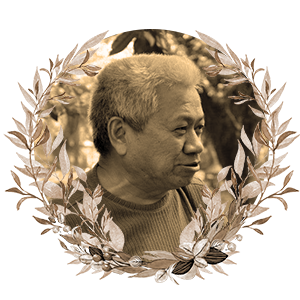
Musician, Singer-Songwriter, Painter
November 4, 1948 – November 15, 2021
Heber Gonzalez Bartolome was a musician, singer, songwriter, guitarist, poet, and painter. He founded protest band Banyuhay ni Heber in the 1970s.
Bartolome started playing music in the late ’60s doing solo gigs in folk houses. He later led Banyuhay with his brothers Jesse and Levi during the Martial Law years. The band’s trademark sound was the kubing, a Philippine musical instrument.
Heber was born in Cabanatuan, Nueva Ecija to a musical family. His father, Deogracias Bartolome, was a pastor, rondalla band leader, and violin and guitar maker, and his mother Angelina Gonzalez was a sarsuwela singer.
Heber earned a Fine Arts degree from the University of the Philippines (UP) in 1973. He founded the UP Astrological Society, was a member of the ROTC Band, and played the french horn with the UP Diliman Concert Chorus.
Apart from being a musician, Bartolome was also an accomplished poet, writer, and painter. He was editor of the UP Philippine Collegian’s Filipino section. He joined the UP Writers’ Club in 1973, and joined the Galian sa Arte at Tula the following year.
In 1975, he finished his master’s degree in Philippine Literature at UP. He taught Filipino Literature at the De La Salle University from 1981 to 1984. As a painter, he participated in art exhibits in Australia, Germany, Brussels, Austria, Spain, and China.
Aside from his creative work, Bartolome was also an avid lobbyist for composers’ rights and was a former member and trustee of the Filipino Society of Composers, Authors, and Publishers (FILSCAP). He served as the organization’s president in 1991.
Bartolome’s compositions have been described as a “unique synthesis of rock and blues, and Philippine ethnic rhythms.” Most of his songs deal with pressing social issues such as poverty, women’s rights, and national identity.
Among his best-known songs are “Tayo’y Mga Pinoy,” “Nena,” “Dukha,” “Pasahero,” and “Almusal,” among others.
“He is a pillar of Pinoy rock. His works have social relevance. But he also has love songs,” Heber’s brother Jesse was quoted as saying in an interview with ABS-CBN.
Songs spring from personal experience, Heber believed. “Wala akong kantang hindi hango sa tunay na karanasan,” Heber said in an interview with GoodNewsPilipinas.com.
“Kasi mahirap magsulat nang hindi mo naman nararanasan. Ang maganda kasi sa mga sinusulat mo, iyong mga binabanggit mong salita, nagmamarka sa mga nakikinig na merong karanasang ganon din.”
Heber was often amazed at how his songs touched people’s lives. In an interview with OPM Archives’ and the Filipinas Heritage Library’s “Muni-Muni Stories,” Bartolome recalled a fellow he met in the mountains of Nueva Ecija during the days when he was dating his future wife Maita Gomez, the Filipina beauty queen who was then with the New People’s Army.
He said the guy didn’t have a clue he was talking to Bartolome. He asked the guy why he joined the insurgency group. “Ang sabi niya meron siyang narinig na kanta – kanta ni Heber Bartolome.”
“I Idolized [Heber] for the clarity of his perspective on what a real Pinoy is, and what needs to be done to serve the country,” National Artist for Music Ryan Cayabyab said in an interview with the Philippine Daily Inquirer.
Perhaps the most poignant tributes to Heber on social media were those that posted lyrics of his own songs, a testament to the power of his words and conviction. Composer Nonoy Gallardo simply tweeted these lines from “Tayo’y Mga Pinoy” that could serve as a fitting epitaph to the folk music legend who promoted Pinoy pride before it was fashionable:
“Tayo’y mga Pinoy, tayo’y hindi Kano // Huwag kang mahihiya kung ang ilong mo ay pango.”
0 Comments